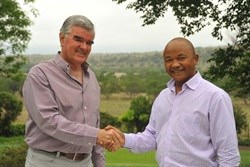
Top stories


Marketing & MediaBehind the campaign: Reframing fairness in ride-hailing: The inDrive success story
inDrive 4 hours




More news

















Both organisations aim to fast-track the inclusion of emerging wool and mohair producers in the formal economy to unlock the enormous economic potential of the industry for South Africa's GDP, while simultaneously addressing unemployment, rural poverty and critical skills shortages affecting wool and mohair industries.
According to Isak Staats, BKB's wool and mohair manager, two systemic barriers are limiting the true economic potential of South Africa's wool and mohair industry.
"Critical skills shortages for the wool and mohair processing is hampering emerging farmers of communal farming co-operatives in the former Transkei and Ciskei. Because of incorrect shearing and wool classing practices the quality, price and marketability of wool and mohair is often affected adversely," he said.
"On the other hand, the shortages of skilled shearers is compelling established South African commercial wool and mohair farmers to use around 1,700 foreign national shearers from neighbouring African countries every year."
Staats believes that if emerging livestock farmers are up-skilled, supported and capacitated to participate in production and agro-processing, the wool and mohair industry's current annual GDP contribution of R2,7 billion can be significantly increased over the next five years.
"If this segment of the market [emerging farmers] is unlocked, South Africa's market share of global wool and mohair exports will move from the current 5% to 8-10%," he said.
Through their partnership, BKB and CDC will recruit 338 beneficiaries from historically disadvantaged communities for a one year, technical shearing and wool classing training programme in PE and Kroonstad jointly funded by both organisations.
The programme and initiative flows from the recent success and outcomes of a R8-million BKB-funded pilot at the agribusiness's newly established shearing college, which has already provided training and employment to 120 beneficiaries from historically disadvantaged communities. Additional training and skills development are now underway to further capacitate learners to become sustainable production and processing of wool and mohair.
Jacobus Le Roux, BKB's marketing and corporate relations manager, said BKB has and always will be committed to developing, empowering and supporting emerging wool and mohair producers to engender sustainable and responsible transformation of agriculture.
"The production, processing and export of wool and mohair is critical to the economy of the country, to our business and also to thousands of emerging producers and workers that depend on the sector.
"Poverty is inter-generational and widespread in Eastern Cape rural communities, and with 40% of the South Africa's entire small livestock population roaming the former Transkei and Ciskei, there is an opportunity to grow commercial agriculture in the region in order to reduce socio-economic inequalities and poverty.
"BKB will continue to support and invest in initiatives that empower. Already through our extensive outreach and capacity building programme in excess of 24,000 rural communal producers are under our wing, benefitting from our technical assistance, market access and production finance," he said.
CDC's executive manager for corporate services Advocate Zuko Mapoma was highly optimistic over the shearing skills development and training initiative during the signing ceremony with BKB's chairman Chris Louw.
"Our partnership with BKB is founded on the corresponding need for job creation and skills capacitation. CDC is always on the lookout for industry leaders with extensive experience and networks in South African economic sectors, and BKB is a world-leader in agriculture," said Mapoma.
"Our involvement in this programme with BKB is a collaboration that will create jobs for those who are unemployed. The envisioned outcome is that the critical and scarce skills will be transferred," he concluded.